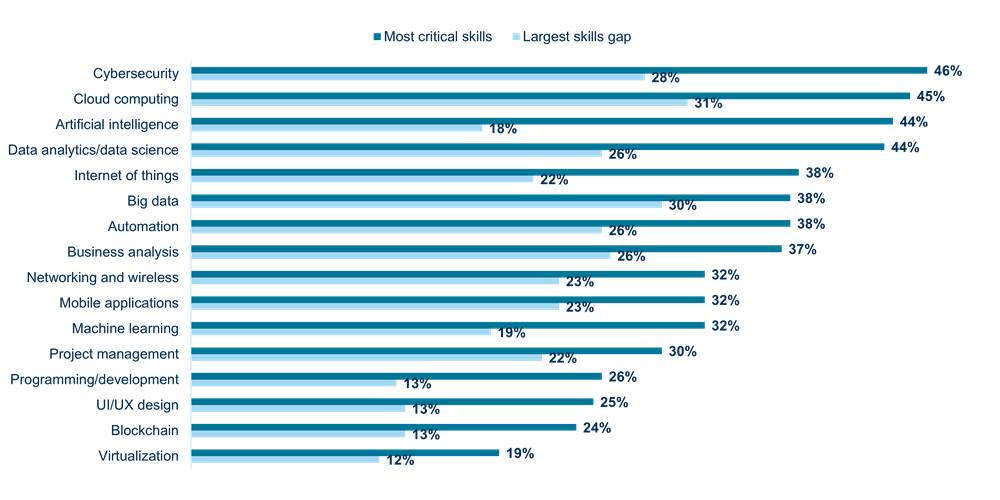Competing for Talent in the Digital Age: Demand Exceeds Supply
Companies face an urgent need to identify new talent pools, as well as reskill and upskill their existing workforce to deliver strategic projects.

Organisations focused on building resilience and flexibility in their business are the most likely to not only survive, but thrive, in times of disruption. These are the organisations who have embraced and are forging ahead with their digital transformation strategies.
However, any transformation project will be obstructed without the skilled talent needed to progress the project and bring it to completion.
TEKsystems conducted an online survey with nearly 600 technology and business decision-makers.
Respondents included members of the C-suite, company executives, vice presidents, directors and managers who have final decision-making authority and/or influence on their organisation’s digital transformation efforts. The sample included a balance of decision-makers in enterprise IT and line-of-business functions in Australia, Canada, China, India, the United Kingdom and the United States, across a broad spectrum of industries. The following article focuses on data specific to the Asia Pacific region and includes responses from nearly 200 decision-makers in Australia, China and India.
People are the Essential Element of Success
Perhaps driven by the relentless competition to attract and retain talent, organisations identified gaps in technical talent as a major challenge to meeting their digital transformation goals. Nine out of 10 organisations reported that they don’t have the talent they need to succeed with digital transformation. The rapid evolution of technologies, business models and ways of working dramatically impact the cornerstone of any company – their people. When companies hit the fast forward button on transformation, weaknesses become abundantly clear.
The Most Critical Skills and the Largest Skills Gap
While the technology industry continues to thrive, organisations are facing competition for talent, from the research, cybersecurity is the most in demand skill (46%), with organisations citing it as critical to the successful completion of their strategic initiatives. Despite being highly sought after, 28% of respondents confirmed that this is also where one of the largest skill gaps exists within their teams – posing a threat to delivery and planned timelines of their ongoing projects.
Cloud computing, Artificial intelligence (AI) and data analytics/data science remain in high demand, with 45%, 44% and 44% of customers respectively reporting a need for specialists in this domain. Despite high demand for cloud, AI and data skills, respondents also reported significant skills gaps when looking for talent in these areas.
Our research found the least in demand skills include programming/development, UX/UI design, and blockchain. Virtualisation is the lowest priority skill with only 19% of those surveyed considering it as critical to their transformation strategy.

Attracting Talent in a Candidate Led Market
Overall, our research showed that the top five most in demand skills needed to complete strategic digital transformation projects were also where some of the largest skill gaps exist. With demand outstripping supply across cybersecurity, cloud, AI, data and IoT, candidates have the power to choose where they work and which projects they want to work on.
Companies face an urgent need to identify new talent pools, as well as reskill and upskill their existing workforce. The integration of AI, automation and collaboration tools are driving significant change in the types of skills employees need to succeed in their jobs. Overcoming these challenges will require creative talent strategies, so companies can acquire and cultivate the skills they need to build a future-ready workforce.
Opportunity for Talent
As organisations continue to move business operations, products and services online, digital transformation remains a strategic priority, and the skills required to do so continue to be in high demand. Capability to build and maintain the cloud environment, protect it from cyber-attacks, and process the resulting data means that for cybersecurity and cloud engineers and data scientists’ their skills look set to remain in high demand for some time to come.
Project management and business analysis skills are also critical to support the digital journey but, with a smaller gap between demand and supply, it will be down to the candidate to ensure they develop quickly and know how to differentiate themselves to stand out from the crowd.